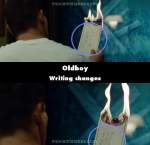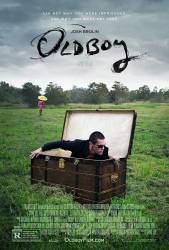Spike Lee's 2013 remake "Oldboy" is a film that I'd refer to as "good in theory." On a very base level, there's a lot the film had going for it right out of the gate. A beloved source material that held a lot of potential to be interpreted in new ways. Top notch talent both on screen and behind the scenes. A newer and wider domestic audience who would be experiencing this story for the first time. Like I said good in theory.
The problem is, while it may very well have been good in theory, quite the opposite is true in practice. Despite having potential, Lee's film ends up amount to little more than a watered down regurgitation of the iconic South Korean original. It takes the same fundamental story and retells it with any of the subtlety and wit that defined the Park Chan-Wook's 2003 film. It takes the same basic characters but removes a great deal of their humanity. It takes the setting and tone and strips away all of the exquisite style that fans of the original so loved. It essentially takes the original movie and removes everything that made it special, leaving only the hollow carcass of a very basic revenge story behind. And even without comparing it to the outstanding original, there's little here to enjoy outside of minor cosmetic flourishes.
An alcoholic advertising executive (Josh Brolin) is captured and placed in a mysterious prison by unknown captors. Left with only a television to keep him company, he slowly changes over twenty years, becoming an entirely new person. When he is suddenly released without explanation, he embarks on an odyssey of revenge, seeking the truth of why he was imprisoned... and why he was suddenly set free.
I originally intended to write this review without comparing the film to Chan-Wook's outstanding original. I really did. But the problem is that this film is for all intents and purposes a near shot-for-shot remake. The stories on a basic level are virtually identical outside of alterations and omissions to "Americanize" the experience. The basic structure is extremely close. And outside of the final few minutes, even the endings are pretty much the same. And as a result well, it's essentially impossible to discuss Lee's "Oldboy" without putting it up against the Chan-Wook film.
And pitting the two films against eachother? Well, it's a pretty open and shut case, sadly. Lee, his crew and the actors produced a film that, while technically watchable, is nothing more than a weaker, adulterated remix that often completely misses the point of the original.
If I were to point out the film's strengths, I will say that star Josh Brolin is well-cast as our lead. Though the material he has to work with is shaky at best, he dives in gung-ho and frequently delivers. I also didn't mind Elizabeth Olsen as our co-lead. She's always been a very likeable actress, and does fairly well with what she's given. And I'd be lying if I said director Lee doesn't occasionally deliver some solid sequences. A fight scene on a high-school football field comes to mind, as does the movie's prolonged imprisonment scene, which is almost as effective as it was in the original... almost. Though the less said about this movie's clunky attempt to recreate the one-shot hallway fight, the better.
As for the film's failings, I think a lot of the blame can be placed on writer Mark Protosevich. I'm sure he's a fan of the original movie, and was trying his hardest. But the script often feels jumbled and patchy. I understand that he was trying to retell the same basic plot while updating it for western audiences, but it just doesn't work. The movie strips out too many key elements that were gravely important to Chan-Wook's film, and it pokes the narrative full of holes. Things that made sense before in the original film no longer make sense in this remake. The movie is also very strange in how it's filled to burst with very minor, surface level changes that are all far worse than the original. It feels like Protosevich just wanted to put his fingerprints on the story, even when it didn't make sense. A good example being the infamous torture scene. In the original, it's a harrowing sequence that's hard to watch it's simple and elegant and rattles you to the bone. In the remake, it's boring and practically comical... the simple change from pulling teeth to cutting skin just isn't as interesting.
I also can't help but notice how much this film butchered the exquisite, stylized look and tone of the original film. Chan-wook's film was practically oozing with flair and originality. Color, patterns, camerawork... everything in that movie felt cool and calculated and specifically designed to give us a unique vision. But the remake? It's tonally and visually indecipherable from the vast majority of other "gritty" fare that pollutes screens in Western markets. It stinks of the bland mindset of "let's desaturate the colors and shake the camera a bit" that too many modern directors relay on. Nothing about the presentation feels unique in this take. It all feels shockingly, tragically by the books. And I can't help but ask what's the purpose of taking a powerhouse like the original "Oldboy" and making it blander and generic?
I also have to comment, as I have seen people saying they've heard the film is more "hardcore" or "violent." One review I read even went so far as to call it more "uncompromising." But that's only true on a very basic, very cosmetic surface level - as in, there's a smidge more on-screen blood in the American film and punching sound effects are a little louder. But the problem is, the violence in the American film also lacks the impact that the original had. You can throw all the blood you want on-screen but nothing in the American film comes close to being as visceral or effective as the South Korean original. That film knew exactly when to utilize violence for the benefit of the film, the story and the characters. When violence occurred in the South Korean movie, it had a purpose, and it hit hard. When something violent happens in the American film? It feels far too obvious and played out.
At the end of the day, it's really hard to defend Spike Lee's "Oldboy" remake. It's just a lamer attempt to parrot an already outstanding film, and it loses a lot in translation thanks to the poor script and shoddy execution. And it earns a sub-par 2 out of 5. While I'd have to say it's objectively at least watchable, it just doesn't do enough to justify its own existence in a world where the original movie exists.
★★☆☆☆
TedStixon






